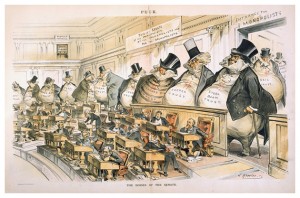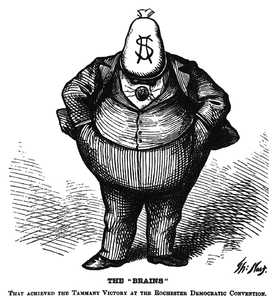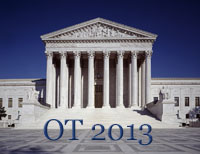Supreme Court Roundup Part Two: Burwell v. Hobby Lobby Stores, Inc.
 On October 30, I participated in a presentation entitled “Supreme Court Roundup” with Ilya Shapiro of the Cato Institute. The event was sponsored by the Law School chapters of the Federalist Society and the American Constitution Society. We discussed three significant cases from the 2013-2014 Supreme Court term: McCutcheon v. FEC, Burwell v. Hobby Lobby and Harris v. Quinn. It was a spirited discussion, in which Mr. Shapiro and I presented opposing views, but I want to thank Mr. Shapiro for taking the time to visit the Law School and sharing his perspective with the students.
On October 30, I participated in a presentation entitled “Supreme Court Roundup” with Ilya Shapiro of the Cato Institute. The event was sponsored by the Law School chapters of the Federalist Society and the American Constitution Society. We discussed three significant cases from the 2013-2014 Supreme Court term: McCutcheon v. FEC, Burwell v. Hobby Lobby and Harris v. Quinn. It was a spirited discussion, in which Mr. Shapiro and I presented opposing views, but I want to thank Mr. Shapiro for taking the time to visit the Law School and sharing his perspective with the students.
This is the second of three blog posts on the presentation. Readers can find the first post here. What follows are my prepared remarks on Burwell v. Hobby Lobby. Readers interested in Mr. Shapiro’s position on the case can refer to the amicus brief that he filed on behalf of the Cato Institute.
The legal issue in Burwell v. Hobby Lobby Stores can be described simply. Under the provisions of the Affordable Care Act, the Department of Health and Human Services requires employers to provide health insurance plans making contraception available to their female employees at no cost. In the NFIB v. Sebelius decision in 2012, the Supreme Court upheld Congress’ power to pass the Affordable Care Act as an exercise of its taxing power. But even if Congress has the power to pass the law, can a for profit corporation nonetheless avoid following the law by arguing that the contraception provisions burden the corporation’s free exercise of religion in violation of the Religious Freedom Restoration Act (RFRA)?
The rights of the individual shareholders that own the corporation were not at issue. The law does not act on the individuals, and does not require these human beings to do anything. The only legal requirement imposed by the law is imposed on the corporate entity.
So what did Congress intend to do when it passed RFRA in 1993? As I will explain, the Hobby Lobby case presents two opposing views as to what Congress attempted to accomplish by passing that law. The dissent by Justice Ginsburg argues that the intent of RFRA was to create a statutory remedy for burdens on religious expression that adopted the standard for evaluating First Amendment violations prior to the 1990 Employment Division v. Smith case. The majority opinion by Justice Alito argues that by passing RFRA Congress created a statutory remedy that protected more “persons” than the pre-Smith caselaw protected and that granted them greater protections than the pre-Smith caselaw granted.


